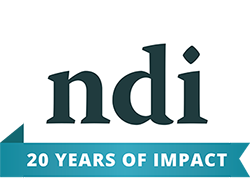By Alexandra McArthur, National Disability Institute Board Chair
In what era would you most like to have lived? This common party question is simple for me. While I know I’d enjoy the glamour of the 1920s, I am constantly grateful that I was born in 1987. As an individual with Muscular Dystrophy, I’m aware that modern technology, such as my motorized wheelchair, allows me to live a meaningful and productive life. While assistive technology has drastically increased inclusion and well-being for millions people with disabilities, it’s a piece of legislation that makes me most grateful to be a product of the 1980s (though snap bracelets were a close second). The Americans with Disabilities Act (ADA), which passed in 1990, provides equal protection and opportunity for the millions of Americans with disabilities.
Thanks to the ADA, I generally don’t worry about being rejected from a job based on discrimination. I use reliable, accessible public transportation, which allows me to be an active member of my community. Equal access to education under the ADA means that I am confident about my educational and professional credentials. I married my college sweetheart and recently purchased my first home. I work full time and save money, which allows me to enjoy social events in my area and travel for pleasure. Ultimately, the ADA has allowed me to grow up expecting everything out of life that someone without a disability might expect. It has allowed me to strive, to work, to accomplish and to plan for my future. Had I been born years earlier, there is no doubt in my mind that very few of these opportunities would have been afforded to me, simply because I use a wheelchair.
There are four major goals of the ADA – equality of opportunity, full participation, independent living and economic self-sufficiency. While my life, in many ways, is an ADA “success story,” it also brings attention to a crucial missing component of the impact of the ADA: economic self-sufficiency.
Currently, people with disabilities in the U.S. are twice as likely to live in poverty than those who do not have a disability. There are many reasons for this, including ongoing barriers to education, employment discrimination and bias, transportation difficulties, lack of access to banking institutions and more. I’m proud to be the Chair of the Board of Directors for National Disability Institute (NDI), a leading nonprofit working on the challenges preventing people with disabilities from making (and saving) money. If you’re not familiar with the organization, I encourage you to visit the NDI website to learn more about its work, including its DISABLE POVERTY grassroots campaign, which aims to bring awareness to the nearly one in three Americans with disabilities in this country that live in poverty. Take the DISABLE POVERTY pledge and learn what actions you can take to spread the word about this important issue.
While my personal and financial picture has been promising from the beginning, thanks in large part to the ADA, I am keenly aware that my financial future remains uncertain. Private insurance generally doesn’t cover personal care. As my neuromuscular condition progresses, I will need additional personal care support in order to help me with everyday activities such as eating, dressing, and bathing. Medicaid is the insurance program that covers personal care. In order to stay below the $2,000/month income threshold required by Medicaid, I may have to resign from my job and spend down nearly all of my hard-earned savings. I may even have to divorce my husband in order to separate our assets and qualify for care, without which I cannot live in my own home.
Does it upset me that in order to receive the care I need – to get out of bed and to work, I, ironically, would need to quit my job and sacrifice much of what I’ve worked for? You bet it does. So while the ADA does afford many protections for people with disabilities, there is still much work to be done.
As National Director of Young Adult and Community Engagement at the Muscular Dystrophy Association, I’m always struck by the expectations and goals of the youth I mentor. They have grown up with the ADA and don’t question if they will go to school, have a great job, date, live on their own in their own apartment or home – similar to what any young person would envision for their life. This is the beauty and the power of the ADA. I am hopeful that with increased focus on economic development for people with disabilities, we will see poverty rates decrease and more people with disabilities living out their version of the “American dream.”
I plan to celebrate July 26th by taking a moment of gratitude for the progress we’ve made since the passing of the ADA, and then getting back to work on the changes in financial policy that we still need to see.
ABOUT THE AUTHOR
Alexandra McArthur is a graduate of Davidson College and is the National Director, Young Adult and Community Engagement for the Muscular Dystrophy Association. She is a founding member of DiversAbility, a global movement to re-brand disability and the AwesomeFoundation Disability Chapter. In 2014, she was chosen as a White House Champion of Change for Disability and Employment. She is currently the Chair of the Board Directors of the National Disability Institute and a board member of Visual Arts Exchange Raleigh.



